REPUBLIKA.CO.ID, BANGKOK -- Thailand's government Thursday rejected calls to postpone February elections after clashes between police and opposition protesters in the capital left one policeman dead and dozens wounded on both sides.
The new outbreak of civil strife deepened the crisis facing Prime Minister Yingluck Shinawatra, whose government has been shaken by weeks of mass street rallies seeking to curb her family's political dominance.
The long-running conflict broadly pits a Bangkok-based middle class and elite against rural and working-class voters loyal to Yingluck's older brother Thaksin Shinawatra, who was ousted as premier by a military coup in 2006.
Police fired tear gas and rubber bullets Thursday at rock-throwing demonstrators who tried to force their way into a sports stadium in the capital where election candidates were gathered to register for the February 2 polls.
The protesters -- who want to overthrow Yingluck's government and install an unelected "people's council" in its place -- accuse billionaire tycoon-turned-politician Thaksin of corruption and say he controls his sister's government from his base in Dubai.
They have vowed to block the February election, saying it will only return Thaksin's allies to power.
Nearly 100 people from both sides were injured, according to the emergency services.
Twenty-five police officers were hospitalised, with 10 in serious condition, according to a police spokesman. One police officer died of a gunshot wound.
"Today democracy in Thailand is hijacked by violence & thuggery. Shame!" Sunai Phasuk, a senior researcher with New York-based Human Rights Watch, wrote on Twitter.
As the violence escalated the Election Commission recommended the February polls be delayed indefinitely.
"We cannot organise free and fair elections under the constitution in the current circumstances," said commission member Prawit Rattanapien, who along with other vote officials had to be evacuated from the stadium by helicopter.
But the government rejected the proposal, saying it would not solve the bitter standoff.
"The government believes delaying an election will cause more violence," Deputy Prime Minister Phongthep Thepkanjana said in a televised address to the nation.
He noted that under the constitution, an election should normally be held no more than 60 days after the dissolution of parliament, which happened in early December.


